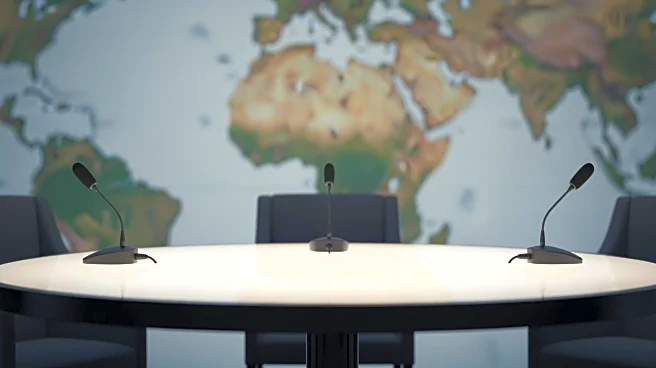What's Happening?
The Israeli government has identified the remains of Eliyahu Margalit, a 76-year-old hostage, handed over by Hamas. Margalit was abducted during a Hamas attack on October 7, 2023, from Kibbutz Nir Oz. His remains were identified by the National Center
for Forensic Medicine, marking the tenth returned hostage body since a ceasefire was established over a week ago. The ceasefire agreement includes the handover of hostages' remains, aid deliveries, and border openings. However, tensions persist as Hamas accuses Israel of violating the ceasefire, citing an incident where nine Palestinians were killed by Israeli fire in Gaza City. The Civil Defense claims the vehicle was hit after crossing into an Israeli-controlled area. Israel maintains control over half of Gaza and asserts that the vehicle posed an imminent threat.
Why It's Important?
The identification of Eliyahu Margalit's remains underscores the fragile nature of the ceasefire agreement between Israel and Hamas. The ongoing exchange of hostages' remains is a critical component of the ceasefire, aimed at ending two years of conflict in Gaza. The incident involving the death of nine Palestinians highlights the challenges in maintaining peace and the potential for renewed hostilities. The situation affects humanitarian efforts, with aid deliveries being constrained due to border closures and restrictions. The humanitarian crisis in Gaza, exacerbated by the conflict, has led to severe shortages and famine, impacting over 2 million residents. The international community is closely monitoring the situation, as any escalation could have significant geopolitical implications.
What's Next?
The ceasefire agreement calls for continued handover of hostages' remains and increased aid deliveries to Gaza. Hamas is urging mediators to expedite aid flow and open the Rafah border crossing with Egypt. The United Nations reports that aid deliveries are below the agreed levels, with only 339 trucks offloaded since the ceasefire began. Israel's defense body overseeing aid in Gaza reported higher numbers, but discrepancies remain. The humanitarian situation in Gaza is dire, with famine declared and over 400 deaths from malnutrition-related causes. The international community may increase pressure on both parties to adhere to the ceasefire terms and address the humanitarian needs.
Beyond the Headlines
The ongoing conflict and ceasefire negotiations in Gaza have broader implications for regional stability and international relations. The humanitarian crisis highlights ethical concerns regarding the treatment of civilians in conflict zones. The situation also raises questions about the effectiveness of international mediation and the role of global powers in facilitating peace. Long-term reconstruction efforts in Gaza will require significant international support and cooperation. The conflict's impact on civilian populations underscores the need for comprehensive solutions that address both immediate humanitarian needs and long-term political resolutions.














